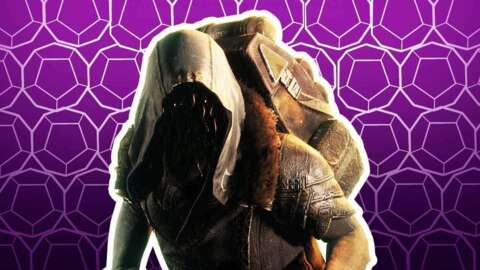It’s Switch 2 rumor season again. Numerous reports of varying credibility have begun to crop up in recent months about a potential new console from Nintendo. We’ve heard everything from whispers of circulating devkits, to manufacturers preparing for increased sales, to analysts and competitors bracing for the financial impact. The discussions have stirred up concerns about backward compatibility following the massive success of the original Switch, given Nintendo’s rocky history with preservation of its own games. And fan communities and podcasts like ours on IGN are speculating wildly about what Nintendo’s next hardware might look like – whether it might be more of a Switch 2, or something new entirely. We know for a fact it’s not happening until at least April 2024, but beyond that? The door’s wide open. Let the speculation flow.
For now, no one knows the truth of any of this except Nintendo itself. But there is one question we can try to answer with our own paltry knowledge: does Nintendo even need a Switch successor next year?
Software-wise, fans have been divided on the subject. Some point to games like Pokemon Scarlet and Violet as prime examples of the Switch struggling and needing an upgrade, and Ubisoft itself said it wishes it had waited to release Mario + Rabbids: Sparks of Hope. But others use games like Xenoblade Chronicles 3, Monster Hunter Rise, or even The Legend of Zelda: Tears of the Kingdom as examples of the console being just fine, thank you very much, with style and design winning out over technological prowess. Meanwhile, Switches continue to sell, with Tears of the Kingdom’s launch in May pushing it back to be the best-selling hardware platform in both dollar and unit sales for the month.
We could speculate here all day, but I wanted to know what the experts thought. So I spoke to eight Switch game developers and three analysts about whether or not Nintendo really needs to drop a new console, Switch 2 or otherwise, next year. And their answers were…about as divided as you might expect.
The Little Console That Could
A number of independent developers I spoke to felt that Nintendo could easily wait until 2025 before introducing a new system, or perhaps even longer. While some of their reasons differed, many suggested that the Switch’s large install base made it ideal for smaller studios with limited resources for console development, with few hardware-related drawbacks for those making games that aren’t necessarily pushing technological boundaries. One anonymous developer who has recently released a game on the Switch suggested they’d even be content to wait until PlayStation and Microsoft released new consoles to see a new Nintendo console, given that the technological gap “isn’t getting any bigger” until then.
Brooks Bishop of Creaky Lantern Games acknowledged that developers who want to push for more advanced graphics likely needed a new machine, but argued that the prospect of new consoles generally is always nerve wracking to smaller developers who have worked to build audiences on current-gen platforms.
“Given Nintendo's guarded and opaque approach to developer relations, should there be a new console there is also no guarantee we'll even be permitted to develop for it. The best case scenario for us is a system with increased hardware specs that is backwards compatible with existing Nintendo Switch software, and tied to the current eShop. This way, no matter what, we can keep working and release our existing projects and they would be available to users of either system. While I think this would be a benefit to consumers, it's also not guaranteed to happen.”
In fact, there was a noticeable divide in the opinions of the developers I chatted with. Those who felt Nintendo could wait longer were largely working on very small projects, generally in 2D or without especially complex technical needs. Developers of larger, better-established, or more visually and technically complex projects were more eager for a Switch successor in the near future. Jonathan B. Jørgensen of Triple Topping Games praised the Switch’s utility for both players and developers, but admitted it was starting to lag behind, even for indie studios.
“Technology has advanced a lot since the Switch was released,” he said. “Indie developers now spend less time optimizing their games, and more time developing features and making their games fun. Releasing on the Nintendo Switch could add a lot of development time for optimization. That might not be economically viable for smaller studios. Compared to the Steam Deck, where a game is likely to just run without needing any optimization.”
Mobeen Fikree, founder of Vertex Pop, agreed. He pointed out that the Switch is “more powerful than folks give it credit for” and “can pull off impressive results in the right hands.” Fikree points to Metroid Prime Remastered as an example. But he also observed that in the time since the Switch has released, technical requirements have evolved. What’s more, developers are increasingly finding themselves in the awkward position of developing for three generations of consoles at once: the Switch, the PS4 and Xbox One, and the PS5 and Xbox Series consoles.
“For many developers, these are just intractable problems that are going to involve making hard decisions/tradeoffs, or result in sub-optimal Switch ports,” Fikree continued. “...From Nintendo’s side, I don’t expect a Switch successor to mean ending support for the Switch. I think the Switch will continue to live on store shelves as Nintendo’s budget platform, and smaller (hopefully weirder!) games will continue to ship on the platform, for at least another 5 years.”
One anonymous developer who is currently working on a game for the Switch was even more firm about its limitations, calling out elements including poor performance, the limitations of the Joy-Con controllers, and especially load times as being significant drawbacks of developing for the console from the beginning:
“As a developer, I can't help but be shocked at the state of things with the development of games on the Nintendo Switch. Already, at the time of the PS4 and Xbox One, developing on the Switch was an optimization challenge: competitors simply offered more powerful consoles. However, the technology and performance gap between consoles then and now is difficult to overcome.
“We therefore have a choice: make a beautiful and dynamic game that runs very well on PS5 and other modern consoles, or stick to making a game that is less attractive and really slower than the competition. So should Nintendo release a new console? The answer is yes, because developers will be tired of developing on an underperforming console while the competition offers cutting-edge features.”
Up and to the right
Like the developers I spoke to, analysts similarly had a mix of thoughts about whether or not a Switch successor was a necessity for Nintendo, though they put the question into financial terms rather than technical ones.
Circana executive director and analysts Mat Piscatella pointed to Circana’s forecast, which has a new Nintendo hardware platform releasing in 2024. But will that actually happen? Piscatella isn’t entirely sure, for the sole reason that Nintendo loves to be unpredictable.
“Given the current sales trajectory of Switch hardware (which, outside of the launch of Tears of the Kingdom has been trending downwards since peaking in 2020) I think the 2024 timing is optimal to ensure a successful generational transition,” he said. “Could they extend it another year, and release a new platform in 2025? Sure, but it would really put them in a tough share position through holiday 2024 and early 2025, especially with the improved momentum of PlayStation 5 and impact of potential additions to the Game Pass offering on Xbox Series devices.”
Piscatella says he considers Nintendo and its consoles to be more “co-opetitive” rather than directly competitive to PlayStation and Xbox, thanks to high numbers of PS5 and Xbox console owners who also own Switches. For that reason, console market share isn’t as big a deal to Nintendo. But nevertheless, the declining sales of the Switch indicate to Piscatella that 2024 is the right year for an upgrade…unless a major first-party title can slow or reverse the downward trends, allowing Nintendo to wait it out until 2025.
Piscatella isn’t alone in his mix of certainty in the number, but uncertainty in Nintendo’s decision-making. Kantan Games’ Dr. Serkan Toto told me that Nintendo “certainly needs an impulse next year” with its predictions of 16.5% decline in hardware sales for the current fiscal year. Without a shot in the arm, sales would “absolutely crater” next year, per Toto.
But, like Piscatella, he’s uncertain, adding that with over $13 billion in cash reserves and zero debt, Nintendo could “comfortably sit out” a year of losses and be secure. “This is Nintendo, the perhaps hardest to gauge game company in the world – god knows what they are really thinking.”
Still, one analyst disagreed with both Piscatella and Toto. James McWhirter, senior analyst at Omdia, told me he doesn’t think Nintendo necessarily needs to launch a new system in 2024, because the Switch “isn’t seeing the declines we would usually associate with a console in the seventh year of its lifecycle,” in part thanks to offsets from the launch of Tears of the Kingdom.
Per Omdia’s forecast, Switch hardware sales are expected to decline by 14% year-over-year in 2023. Compare that, McWhirter says, to PlayStation 4 hardware sales declines of 31% in its seventh year on the market. And he also points out that Xbox Series X and S sales have actually declined year over year at a faster rate than the Switch in many major territories, despite the Xbox being in what would typically be considered a “growth phase” of its lifecycle.
“The new Zelda’s focus on user-generated content has clearly given [the Switch] legs - Switch hardware sales just had their best June in Japan, and second best-ever May in North America,” McWhirter said. “Super Mario Bros. Wonder should be a similarly huge event for the platform – remember Nintendo shifted four million Wii consoles in North America alone in December 2009 when it launched New Super Mario Bros. Wii that month.”
That said, McWhirter noted that Omdia too is predicting a Switch successor launch in the first quarter of 2024, noting the company’s current first-party lineup of games typically used to support a console’s “twilight years.” And he predicts a successful new console launch at that. He points out that the Switch’s massive install base combined with an appetite for an upgrade indicates that a new console is “certainly going to outpace the original Switch.”
A Switch swan song?
Putting it all together, the portrait of Nintendo as it nears the Switch’s curtain call is certainly a chaotic one. Its massive install base means both fans and developers are eager to keep it around for longer and are hungry for backwards compatibility to support its giant library for years to come. Its technical limitations are either dire or negligible, depending on who you ask. It’s selling very well for where it is in its life cycle, but also sales are trending downward at a pace that might upset shareholders. It’s currently competing with PS5 and Xbox Series X and S successfully, but also it doesn’t need to, because it’s so different and also supplementary to both. It’s a dying console, and also one that’s vibrantly alive seven years into its life cycle – a dramatic contrast to the death throes of the poor Wii U.
So does Nintendo need to release a new hardware in 2024? The answer, as best I can tell, is no. Not because the company is financially failure-proof, or because developers and fans don’t want it, because it’s not and they do. But Nintendo doesn’t need to release a new console in 2024 because Nintendo doesn’t need to do anything in particular, and that’s what makes predicting its next console step so difficult.
As the analysts I spoke with told me, Nintendo is a maverick of a console manufacturer, historically more of a toymaker than a consistent force in the hardware market. It has enough financial and brand security to take experimental risks like the Wii U and Switch, something it’s done both to its detriment and benefit numerous times over the years. For all we know, Nintendo has a console ready to go right now and is sitting on it comfortably until it sees Switch sales dip low enough. Or, alternatively, its R&D division is struggling to solve some new hardware problem and it won’t be ready until 2025. Who can say?
Certainly, Nintendo has something in the works that is close to ready for a new console generation, and will release it when the product is done. Unlike PlayStation and Xbox, which are stuck in a cycle of competition directly with one another each generation, Nintendo can comfortably wait until its executives feel the time is ripe for whatever strange new toy it’s concocted. And while we can do our best to hazard guesses at when and what that might entail, ultimately, predicting Nintendo is pure chaos magic that, historically, no one has fully mastered.
I think Piscatella put it best in part of his response to me:
“Nintendo tends to surprise,” he said. “Ultimately it will come down to their own internal financial goals and, more importantly, where they think development is and how confident they are on the likelihood of success for the new platform. They're not likely to launch a new platform that isn't ready just to get it out there and make their quarter.
“No analyst has ever gotten rich by consistently being able to successfully predict what Nintendo is going to do. I ain't gonna be the first.”
Rebekah Valentine is a senior reporter for IGN. Got a story tip? Send it to rvalentine@ign.com.




